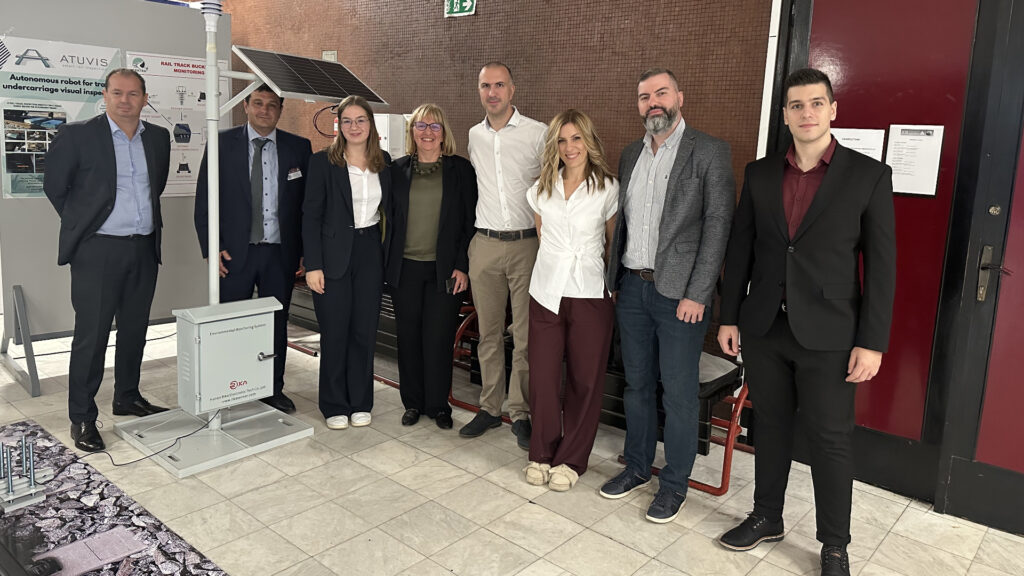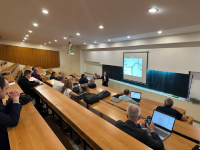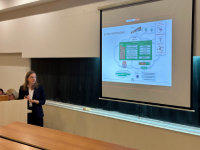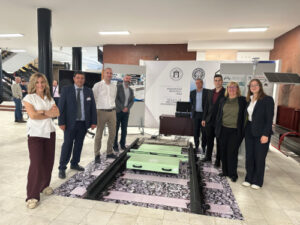WORKSHOP “Advanced satellite-based technology in land transport” WAS ORGANISED WITHIN RAILCON’24

The Workshop “Advanced satellite-based technology in land transport” took place on 10th October 2024 within the XXI International expert-scientific Conference on Railway RAILCON ’24 hosted by Faculty of Mechanical Engineering, University of Niš, Serbia.
The workshop gathered researchers, developers and stakeholders from the space and transport sectors. The Workshop was organized as a hybrid event and included presentation of four research & innovation projects aiming at using the satellite-based technology in land transport, including both main land transport types, road and rail. The project’s presentations were followed by fruitful discussions that included on-site as well as on-line workshop participants. The following projects were presented:
- SPATRA – Space-Based Applications for Transport Monitoring and Management
The SPATRA project, funded by the EU/EUSPA, aims to use satellite data to improve monitoring and management within transport systems. Its focus on using satellite insights for real-time transport monitoring was well received, with conference attendees showing keen interest in the potential applications of these solutions in the railway industry. - JULIA – Joint Developments for Urban Resilience Connecting Users to Public Transport through Space Technology
The JULIA project, another EU/EUSPA-funded initiative, focuses on urban resilience. It seeks to connect users with public transport systems via satellite technologies, enhancing the adaptability and responsiveness of urban transport networks. This project’s emphasis on resilient transport in cities resonated with attendees, especially those interested in integrating space technology into urban planning. - IIMEO – Instantaneous Infrastructure Monitoring by Earth Observation
Supported by the EU, IIMEO explores how earth observation can contribute to infrastructure monitoring. By providing real-time, satellite-based data on infrastructure conditions, this project enables proactive maintenance and management strategies. Participants at RAILCON noted the relevance of these capabilities for infrastructure resilience in rail and road networks, a critical consideration in the context of increasing transportation demands. - Space4LevelCrossing – Space-Based Innovative Solutions for Level Crossing Safety
Funded by the European Space Agency (ESA), Space4LevelCrossing focuses on safety at railway crossings. The project uses satellite data to monitor and improve level crossing safety, an area of increasing concern globally. The RAILCON workshop discussions revealed strong interest in the practical applications of this project, with several experts pointing out how satellite monitoring could address safety challenges in railway infrastructure.
Workshop Highlights
The workshop began with an introduction during the morning plenary session, where SPATRA’s project coordinator, Prof. Dr.-Ing. Danijela Ristić-Durrant, presented a collaborative paper titled “Using Satellite Data for Railway Infrastructure Monitoring.” This presentation outlined the role of satellite technology in enhancing monitoring and management, with specific emphasis on railway applications. The insights shared resonated with railway experts and researchers alike, sparking discussions on the multidisciplinary impact of satellite technologies.

Following the plenary session, the workshop shifted focus to the individual project presentations. Each project illustrated unique aspects of satellite data usage, from real-time monitoring to safety enhancements. The interactive format allowed both in-person and virtual attendees to engage directly with project leaders, leading to a series of productive exchanges on satellite applications in railways and other land transport sectors.



In conclusion, the workshop emphasized the role of satellite technology as a pivotal enabler of modern transport management, offering new perspectives on infrastructure safety, urban resilience, and real-time monitoring. As RAILCON ’24 ended, attendees reflected on the transformative potential of these projects, noting that their integration could significantly advance railway operations in the years to come.


The SPATRA project’s involvement in this conference not only demonstrated its ongoing commitment to improving transport systems but also fostered collaboration among European experts in transportation and space technology. The success of the workshop underscored the importance of cross-sector partnerships in achieving sustainable, efficient, and safe transport solutions for the future.